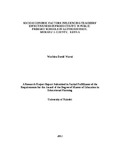| dc.contributor.author | Wachira, David W | |
| dc.date.accessioned | 2013-09-18T05:58:47Z | |
| dc.date.available | 2013-09-18T05:58:47Z | |
| dc.date.issued | 2013 | |
| dc.identifier.citation | Degree of Master of Education in Educational Planning | en |
| dc.identifier.uri | http://erepository.uonbi.ac.ke:8080/xmlui/handle/123456789/56627 | |
| dc.description | A Research Project Report Submitted in Partial Fulfillment of the
Requirements for the Award of the Degree of Master of Education in
Educational Planning | en |
| dc.description.abstract | The study sought to find out the social economic factors influencing teachers
effectiveness in productivity in Gaturi Division, Murang’a County, Kenya. The
objectives that guided the study were remuneration, school facilities, headteachers
levels of training in financial management and class sizes. The target population for
the study was the headteachers and teachers in all primary schools in the Gaturi
division and the District Quality Assurance and Standards Officer. They were all two
hundred and seventy one in number. The simple random sampling method was used
to pick the teacher and the head teacher population. The sample size for the teachers
and head teachers was fifty percent of the population. One hundred and twenty
teachers, fifteen headteachers and one Quality Assurance and Standards Officer were
included in the sample size.
The study employed the descriptive survey design. Data was collected by use of
questionnaires and interview schedules. Data was analyzed using descriptive statistics
and inferential statistics and thereafter presented by use of statistical means. The
results were subjected to statistical tests which entailed chi-square tests and spearman
rank correlation order tests. The study found out that the teachers considered their
remuneration levels as inadequate and an impediment to their effectiveness in
productivity. The teachers equally viewed the school facilities as not upto the
standards of ensuring their optimum productivity. The headteachers training in
financial management was deemed as very inadequate by the teachers thus a factor
which greatly hindered their effectiveness in productivity. The class sizes in the
division were considered as large by all the respondents. They argued that the class
sizes stretched the teachers’ capacities to the maximum and greatly curtailed them in
terms of the capacity to be effective by way of giving individual attention to the
pupils.
The study thus concluded that teachers’ effectiveness in productivity was impaired
and affected by the remuneration levels, the school facilities, the headteachers’
training and the large classes which hindered the capacity of the teachers to be
effective in terms of delivering their professional obligations and mandates to the
letter.
The study recommended that the teachers emoluments and salaries should be
reviewed and more innovative approaches geared towards enhancing their
effectiveness in productivity should be employed like putting in place performance
tokens for high achievers. The study recommended the involvement of private sector
participation in facilities upgrade to ensure inadequacies and shortfalls were met. The
headteachers should be confirmed to the positions only after undertaking a mandatory
training on financial management and get subjected to continuous learning by way of
refresher courses. The class sizes should be taken care of by way of the exchequer
meeting staffing shortfalls and facilities inadequacies to ensure that the pupils get
value from the education systems. | en |
| dc.language.iso | en | en |
| dc.publisher | University of Nairobi | en |
| dc.title | Socio-economic factors influencing teachers’ effectiveness in productivity in public primary schools in Gaturi Division, Murang’a County, Kenya | en |
| dc.type | Thesis | en |
| local.publisher | School of Education | en |

